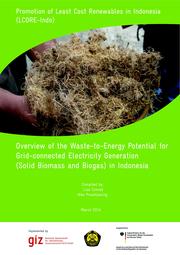Difference between revisions of "Biomass Potential in the Indonesian Agroindustry"
***** (***** | *****) m |
***** (***** | *****) m |
||
| Line 1: | Line 1: | ||
| − | = Summary = | + | == Summary == |
The study "Overview of the Waste-to-Energy Potential for Grid-connected Electricity Generation (Solid Biomass and Biogas) in Indonesia" by Lisa Conrad and Ikke Prasetyaning provides an overview of the potentials from biomass waste available from the agroindustry in Indonesia – for electricity generation and CO2 emission reductions. In its analyses the study looks at 1) theoretical, 2) technical, and 3) economic potential. | The study "Overview of the Waste-to-Energy Potential for Grid-connected Electricity Generation (Solid Biomass and Biogas) in Indonesia" by Lisa Conrad and Ikke Prasetyaning provides an overview of the potentials from biomass waste available from the agroindustry in Indonesia – for electricity generation and CO2 emission reductions. In its analyses the study looks at 1) theoretical, 2) technical, and 3) economic potential. | ||
| Line 16: | Line 16: | ||
<br/> | <br/> | ||
| − | = Study = | + | == Study == |
[[File:Biomass Potential Indosian Agroindustry.pdf|180px|Overview of the Waste-to-Energy Potential for Grid-connected Electricity Generation (Solid Biomass and Biogas) in Indonesia|alt=Overview of the Waste-to-Energy Potential for Grid-connected Electricity Generation (Solid Biomass and Biogas) in Indonesia]] | [[File:Biomass Potential Indosian Agroindustry.pdf|180px|Overview of the Waste-to-Energy Potential for Grid-connected Electricity Generation (Solid Biomass and Biogas) in Indonesia|alt=Overview of the Waste-to-Energy Potential for Grid-connected Electricity Generation (Solid Biomass and Biogas) in Indonesia]] | ||
| Line 24: | Line 24: | ||
<br/> | <br/> | ||
| − | = See also = | + | == See also == |
[https://energypedia.info/wiki/Portal:Solid_Biomass Solid Biomass Portal] | [https://energypedia.info/wiki/Portal:Solid_Biomass Solid Biomass Portal] | ||
| Line 34: | Line 34: | ||
[http://www.lcore-indonesia.or.id/ GIZ Programme: Least Cost Renewables in Indonesia (LCORE-INDO)] | [http://www.lcore-indonesia.or.id/ GIZ Programme: Least Cost Renewables in Indonesia (LCORE-INDO)] | ||
| + | [[Category:Waste-to-energy]] | ||
| + | [[Category:Indonesia]] | ||
| + | [[Category:Biomass]] | ||
| + | [[Category:Bioenergy]] | ||
[[Category:Powering_Agriculture]] | [[Category:Powering_Agriculture]] | ||
| − | |||
| − | |||
| − | |||
| − | |||
Revision as of 15:54, 8 May 2014
Summary
The study "Overview of the Waste-to-Energy Potential for Grid-connected Electricity Generation (Solid Biomass and Biogas) in Indonesia" by Lisa Conrad and Ikke Prasetyaning provides an overview of the potentials from biomass waste available from the agroindustry in Indonesia – for electricity generation and CO2 emission reductions. In its analyses the study looks at 1) theoretical, 2) technical, and 3) economic potential.
Since agro industries in the palm oil sector, in rice paddy and sugar cane count for 80% of all residues in the Indonesian agro industry, those three industries were investigated (palm oil crops 100 mt/ year, rice paddy 69 mt/ year, sugar cane 30 mt/ year.
In regards to theoretical potential, those three commodities have a electricity generation potential of total 328 TWh per year with an equivalent power capacity of 46 GWe.
Considering grid availability, the technical potential of electricity production from the three industries is lower with 43 TWH, with a CO2 saving potential of approximately 39 mio tons per year. This potential of 43 TWh/year from the biomass/biogas power plant could meet Indonesia’s electricity demand of 174 TWh/year by 25%.
However, this figure being significantly lower than the theoretical electricity generation potential of 328 TWh/year demonstrates that the availability of interconnected transmission grid is still a significant barrier in Indonesia.
To evaluate the economic bioenergy potential in Indonesia ownership of the industry sector as well as market selling price of the feedstock and the feed-in tariff are taken into account. Currently, only projects using biogas from palm oil effluents with very short distance to the grid and high processing capacities might be considered for evaluation of economic potential.
Study
See also
GIZ Programme: Least Cost Renewables in Indonesia (LCORE-INDO)




















